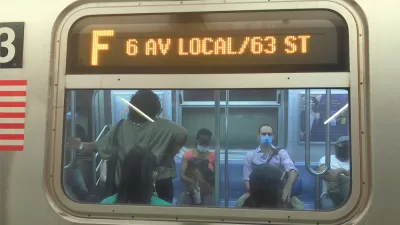A new report on the finances of the New York Metropolitan Transportation Authority (MTA) makes a desperate plea for assistance from the federal government.

Joseph Spector shares news of a report by New York State Comptroller Thomas DiNapoli that describes the funding shortfalls at the New York Metropolitan Transportation Authority (MTA) as the "greatest crisis" in the history of the transit agency.
"The MTA’s financial condition is dire,” DiNapoli said in a statement quoted in the article. "With ridership down, debt burden rising and no additional help likely from New York state or New York City, the MTA desperately needs an influx of federal funds or unheard of service cuts and workforce reductions will happen."
According to the report, the NTA faces a $6.3 billion projected gap next year is more than half of the MTA’s annual projected revenue—a hole that could not be closed without an infusion in aid. That projected budget gap is expected to grow to $12 billion over four years, reports Spector.
The MTA has been seeking $12 billion in funding to whether the fiscal storm brought by the coronavirus pandemic—an ask complicated by the stalled progress of federal stimulus talks in Congress in recent days and weeks.
Over the course of the pandemic, transit planning in the city of New York has been a tale of two modes: bus ridership has rebounded faster from pandemic lows than subway ridership. The MTA cut overnight service on the subway (for debatable purposes) before the city ramped up planning for new bus lanes around the city.
FULL STORY: MTA faces 'greatest crisis' in its history. What a new report shows.

Planetizen Federal Action Tracker
A weekly monitor of how Trump’s orders and actions are impacting planners and planning in America.

Restaurant Patios Were a Pandemic Win — Why Were They so Hard to Keep?
Social distancing requirements and changes in travel patterns prompted cities to pilot new uses for street and sidewalk space. Then it got complicated.

Maui's Vacation Rental Debate Turns Ugly
Verbal attacks, misinformation campaigns and fistfights plague a high-stakes debate to convert thousands of vacation rentals into long-term housing.

In California Battle of Housing vs. Environment, Housing Just Won
A new state law significantly limits the power of CEQA, an environmental review law that served as a powerful tool for blocking new development.

Boulder Eliminates Parking Minimums Citywide
Officials estimate the cost of building a single underground parking space at up to $100,000.

Orange County, Florida Adopts Largest US “Sprawl Repair” Code
The ‘Orange Code’ seeks to rectify decades of sprawl-inducing, car-oriented development.
Urban Design for Planners 1: Software Tools
This six-course series explores essential urban design concepts using open source software and equips planners with the tools they need to participate fully in the urban design process.
Planning for Universal Design
Learn the tools for implementing Universal Design in planning regulations.
Heyer Gruel & Associates PA
JM Goldson LLC
Custer County Colorado
City of Camden Redevelopment Agency
City of Astoria
Transportation Research & Education Center (TREC) at Portland State University
Jefferson Parish Government
Camden Redevelopment Agency
City of Claremont





























